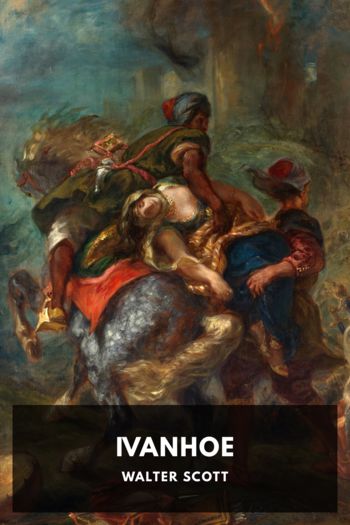Ivanhoe - Walter Scott (bookreader txt) 📗

- Author: Walter Scott
Book online «Ivanhoe - Walter Scott (bookreader txt) 📗». Author Walter Scott
“It is sad enough,” replied Athelstane; “but I trust they will hold us to a moderate ransom—At any rate it cannot be their purpose to starve us outright; and yet, although it is high noon, I see no preparations for serving dinner. Look up at the window, noble Cedric, and judge by the sunbeams if it is not on the verge of noon.”
“It may be so,” answered Cedric; “but I cannot look on that stained lattice without its awakening other reflections than those which concern the passing moment, or its privations. When that window was wrought, my noble friend, our hardy fathers knew not the art of making glass, or of staining it—The pride of Wolfganger’s father brought an artist from Normandy to adorn his hall with this new species of emblazonment, that breaks the golden light of God’s blessed day into so many fantastic hues. The foreigner came here poor, beggarly, cringing, and subservient, ready to doff his cap to the meanest native of the household. He returned pampered and proud, to tell his rapacious countrymen of the wealth and the simplicity of the Saxon nobles—a folly, oh, Athelstane, foreboded of old, as well as foreseen, by those descendants of Hengist and his hardy tribes, who retained the simplicity of their manners. We made these strangers our bosom friends, our confidential servants; we borrowed their artists and their arts, and despised the honest simplicity and hardihood with which our brave ancestors supported themselves, and we became enervated by Norman arts long ere we fell under Norman arms. Far better was our homely diet, eaten in peace and liberty, than the luxurious dainties, the love of which hath delivered us as bondsmen to the foreign conqueror!”
“I should,” replied Athelstane, “hold very humble diet a luxury at present; and it astonishes me, noble Cedric, that you can bear so truly in mind the memory of past deeds, when it appeareth you forget the very hour of dinner.”
“It is time lost,” muttered Cedric apart and impatiently, “to speak to him of aught else but that which concerns his appetite! The soul of Hardicanute hath taken possession of him, and he hath no pleasure save to fill, to swill, and to call for more.—Alas!” said he, looking at Athelstane with compassion, “that so dull a spirit should be lodged in so goodly a form! Alas! that such an enterprise as the regeneration of England should turn on a hinge so imperfect! Wedded to Rowena, indeed, her nobler and more generous soul may yet awake the better nature which is torpid within him. Yet how should this be, while Rowena, Athelstane, and I myself, remain the prisoners of this brutal marauder and have been made so perhaps from a sense of the dangers which our liberty might bring to the usurped power of his nation?”
While the Saxon was plunged in these painful reflections, the door of their prison opened, and gave entrance to a sewer, holding his white rod of office. This important person advanced into the chamber with a grave pace, followed by four attendants, bearing in a table covered with dishes, the sight and smell of which seemed to be an instant compensation to Athelstane for all the inconvenience he had undergone. The persons who attended on the feast were masked and cloaked.
“What mummery is this?” said Cedric; “think you that we are ignorant whose prisoners we are, when we are in the castle of your master? Tell him,” he continued, willing to use this opportunity to open a negotiation for his freedom—“Tell your master, Reginald Front-de-Boeuf, that we know no reason he can have for withholding our liberty, excepting his unlawful desire to enrich himself at our expense. Tell him that we yield to his rapacity, as in similar circumstances we should do to that of a literal robber. Let him name the ransom at which he rates our liberty, and it shall be paid, providing the exaction is suited to our means.” The sewer made no answer, but bowed his head.
“And tell Sir Reginald Front-de-Boeuf,” said Athelstane, “that I send him my mortal defiance, and challenge him to combat with me, on foot or horseback, at any secure place, within eight days after our liberation; which, if he be a true knight, he will not, under these circumstances, venture to refuse or to delay.”
“I shall deliver to the knight your defiance,” answered the sewer; “meanwhile I leave you to your food.”
The challenge of Athelstane was delivered with no good grace; for a large mouthful, which required the exercise of both jaws at once, added to a natural hesitation, considerably damped the effect of the bold defiance it contained. Still, however, his speech was hailed by Cedric as an incontestible token of reviving spirit in his companion, whose previous indifference had begun, notwithstanding his respect for Athelstane’s descent, to wear out his patience. But he now cordially shook hands with him in token of his approbation, and was somewhat grieved when Athelstane observed, “that he would fight a dozen such men as Front-de-Boeuf, if, by so doing, he could hasten his departure from a dungeon where they put so much garlic into their pottage.” Notwithstanding this intimation of a relapse into the apathy of sensuality, Cedric placed himself opposite to Athelstane, and soon showed, that if the distresses of his country could banish the recollection of food while the table was uncovered, yet no sooner were the victuals put





Comments (0)